Dirty Weekend (1993)
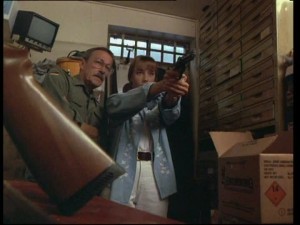 When you’ve made silly movies all your life and you suddenly want to be taken seriously, where do you go? Director Russ Meyer (Faster, Pussycat! Kill! Kill!, Vixen!, Cherry, Harry, and Raquel) made quickly edited, campy movies filled with irony, with the stories often about women with large breasts using their sexuality to the best of their advantages. When he tried to go straight, such as with his 1971 courtroom film The Seven Minutes (given to him by Fox after the success of Beyond the Valley of the Dolls), the advantages he had as a low budget exploitation filmmaker disappeared, and his style became useless.
When you’ve made silly movies all your life and you suddenly want to be taken seriously, where do you go? Director Russ Meyer (Faster, Pussycat! Kill! Kill!, Vixen!, Cherry, Harry, and Raquel) made quickly edited, campy movies filled with irony, with the stories often about women with large breasts using their sexuality to the best of their advantages. When he tried to go straight, such as with his 1971 courtroom film The Seven Minutes (given to him by Fox after the success of Beyond the Valley of the Dolls), the advantages he had as a low budget exploitation filmmaker disappeared, and his style became useless.
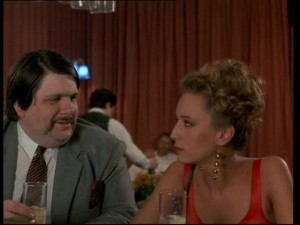 Meyer went back to making silly low-budget movies after that, eventually concluding his career with Beneath the Valley of the Ultra-Vixens (the third film he wrote with Roger Ebert) which is like a parody of his own parodist style.
Meyer went back to making silly low-budget movies after that, eventually concluding his career with Beneath the Valley of the Ultra-Vixens (the third film he wrote with Roger Ebert) which is like a parody of his own parodist style.
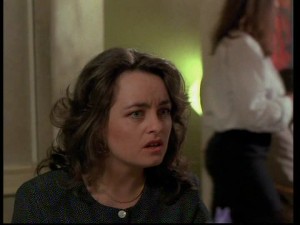 Michael Winner tried a similar tack with 1993’s Dirty Weekend, after a career of making schlocky, crude exploitation with Charles Bronson (Death Wish I-III, The Mechanic (1972), Chato’s Land) and whomever else would pay to provide Winner with funds for his frequently mean-spirited idiocy (The Wicked Lady remake, Firepower, The Big Sleep remake). After the be-all end-all of over-the-top cartoon nonsense that was Death Wish III, Winner waited a few years before directing an Agatha Christie adaptation (Appointment With Death) and a true attempt at legitimacy, A Chorus of Disapproval, starring Anthony Hopkins and Jeremy Irons in a low-key drama about small-town theatre. When that didn’t work out, Winner was flummoxed, producing a lowbrow caper comedy with Roger Moore and Michael Caine called Bullseye! After Bullseye!’s failure, Winner was stuck once again. Should he go back to the well and make a vigilante movie like the success he had with the Death Wish series?
Michael Winner tried a similar tack with 1993’s Dirty Weekend, after a career of making schlocky, crude exploitation with Charles Bronson (Death Wish I-III, The Mechanic (1972), Chato’s Land) and whomever else would pay to provide Winner with funds for his frequently mean-spirited idiocy (The Wicked Lady remake, Firepower, The Big Sleep remake). After the be-all end-all of over-the-top cartoon nonsense that was Death Wish III, Winner waited a few years before directing an Agatha Christie adaptation (Appointment With Death) and a true attempt at legitimacy, A Chorus of Disapproval, starring Anthony Hopkins and Jeremy Irons in a low-key drama about small-town theatre. When that didn’t work out, Winner was flummoxed, producing a lowbrow caper comedy with Roger Moore and Michael Caine called Bullseye! After Bullseye!’s failure, Winner was stuck once again. Should he go back to the well and make a vigilante movie like the success he had with the Death Wish series?
 That was probably the initial idea with Dirty Weekend, simply flipping the plot around to feature a woman fighting back against sexism, misogyny, and the patriarchal British society. Whether his skills had eroded by then isn’t clear, but Dirty Weekend is either a totally inept and glib vigilante movie or Winner’s idea of a parody, where all men need not even be reasonably provoked to want to rape and abuse women. If the former is true, then it would be fair to call Dirty Weekend an embarrassing disaster. If it’s the latter, then Winner still hasn’t made anything better than schlock, but his tendency to be unsubtle and boorish aids the cause.
That was probably the initial idea with Dirty Weekend, simply flipping the plot around to feature a woman fighting back against sexism, misogyny, and the patriarchal British society. Whether his skills had eroded by then isn’t clear, but Dirty Weekend is either a totally inept and glib vigilante movie or Winner’s idea of a parody, where all men need not even be reasonably provoked to want to rape and abuse women. If the former is true, then it would be fair to call Dirty Weekend an embarrassing disaster. If it’s the latter, then Winner still hasn’t made anything better than schlock, but his tendency to be unsubtle and boorish aids the cause.
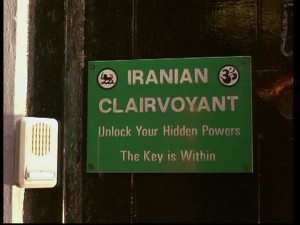 Beginning with the patronizing voiceover from the wholly unappealing lead character, Bella (played poorly by Lia Williams, who looks like a low-rent TV version of Jodie Foster, who of course would have her own turn at Death Wish in Neil Jordan’s The Brave) as she details how she is a doormat for her boyfriend, Winner tries to make us feel sorry for her, but his direction and editing is often so sloppy as to confuse before we even get the chance. When Bella catches her boyfriend cheating on her and is forced to move out of their apartment, it’s never clear before that that she lived with him, or if she didn’t, why she’d have to move just because a relationship of a few months ended.
Beginning with the patronizing voiceover from the wholly unappealing lead character, Bella (played poorly by Lia Williams, who looks like a low-rent TV version of Jodie Foster, who of course would have her own turn at Death Wish in Neil Jordan’s The Brave) as she details how she is a doormat for her boyfriend, Winner tries to make us feel sorry for her, but his direction and editing is often so sloppy as to confuse before we even get the chance. When Bella catches her boyfriend cheating on her and is forced to move out of their apartment, it’s never clear before that that she lived with him, or if she didn’t, why she’d have to move just because a relationship of a few months ended.
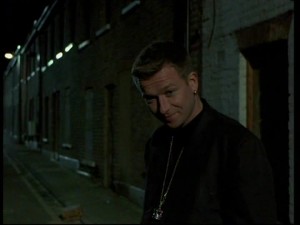 When she does move, she begins to be harassed by a neighbor who stares at her through the window and makes threateningly sexual phone calls. This might work as a set-up for the remainder of the film, but the stalker, played by Rufus Sewell (Dark City), has two problems: First Winner directed him to stare at Bella with his hands practically glued to the window sill like an anxious puppy looking for his owner, and second that Sewell looks too much like Williams, especially in the eyes, for it to seem like a real threat, as opposed to just standard brotherly bullying. Of course, when she goes to the police, the cop turns out to be a semi-rapist too, and so is every man she meets from then on.
When she does move, she begins to be harassed by a neighbor who stares at her through the window and makes threateningly sexual phone calls. This might work as a set-up for the remainder of the film, but the stalker, played by Rufus Sewell (Dark City), has two problems: First Winner directed him to stare at Bella with his hands practically glued to the window sill like an anxious puppy looking for his owner, and second that Sewell looks too much like Williams, especially in the eyes, for it to seem like a real threat, as opposed to just standard brotherly bullying. Of course, when she goes to the police, the cop turns out to be a semi-rapist too, and so is every man she meets from then on.
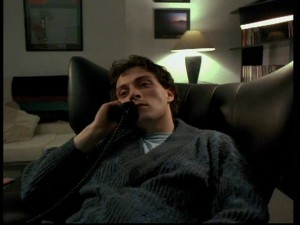 It takes a visit to an Iranian clairvoyant for her to realize she has to start killing men for the good of society and herself (“you women are too soft!” says the guy at the gun store). And after dispatching her first victim, she actively starts seeking out men to eliminate, at least when they’re not available to pop up like villains in a video game (the movie appropriately ends in a video arcade, during yet another attempted rape). She kills one guy because he’s um… horny and fat? And she’ll walk into any situation pretending to be innocent, with will cause the men to freak out and try to sexually assault her. The logic there is minimal, but then there wouldn’t be any “revenge” in Dirty Weekend if the men weren’t, to a fault, animals 100% of the time.
It takes a visit to an Iranian clairvoyant for her to realize she has to start killing men for the good of society and herself (“you women are too soft!” says the guy at the gun store). And after dispatching her first victim, she actively starts seeking out men to eliminate, at least when they’re not available to pop up like villains in a video game (the movie appropriately ends in a video arcade, during yet another attempted rape). She kills one guy because he’s um… horny and fat? And she’ll walk into any situation pretending to be innocent, with will cause the men to freak out and try to sexually assault her. The logic there is minimal, but then there wouldn’t be any “revenge” in Dirty Weekend if the men weren’t, to a fault, animals 100% of the time.
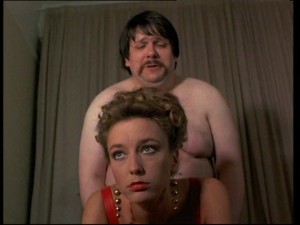 Is Winner making a statement about his own simplicity in the moral universe of the Death Wish series, where no one was above being a criminal, and everyone deserved a bullet? It’s really not clear, because when the humor is clearly intentional (“Tell me about your family.” “My parents eat a lot of fruit.”) it’s not consistent with the type of humor that would have to be applied to tolerate the rest of the film. There’s an A-Team sequence where Bella gets herself ready to go out and hunt, prepping her supplies, but it doesn’t appear to be intentionally funny. There’s an incredibly poorly staged scene where someone gets run over by a car, but it seems that it’s meant to be shocking. Bella’s frequent and unnecessary narration is laughable, but who knows if Winner is just being unsubtle again. When three random thugs decide to rape an old homeless lady, is it a commentary on how relentlessly desperate filmmakers get when making a revenge film and have to continuously produce new foes?
Is Winner making a statement about his own simplicity in the moral universe of the Death Wish series, where no one was above being a criminal, and everyone deserved a bullet? It’s really not clear, because when the humor is clearly intentional (“Tell me about your family.” “My parents eat a lot of fruit.”) it’s not consistent with the type of humor that would have to be applied to tolerate the rest of the film. There’s an A-Team sequence where Bella gets herself ready to go out and hunt, prepping her supplies, but it doesn’t appear to be intentionally funny. There’s an incredibly poorly staged scene where someone gets run over by a car, but it seems that it’s meant to be shocking. Bella’s frequent and unnecessary narration is laughable, but who knows if Winner is just being unsubtle again. When three random thugs decide to rape an old homeless lady, is it a commentary on how relentlessly desperate filmmakers get when making a revenge film and have to continuously produce new foes?
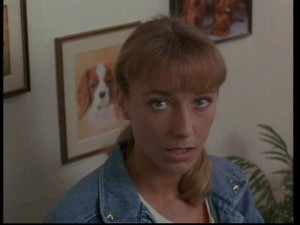 There’s no way to tell, but if I could hazard a guess, it’s in the soundtrack. Whenever Bella is about to attack someone, the music mixes clanging noises and what is unmistakably the sound of the bubbling that occurs when someone is inhaling drugs through a bong or paraphernalia. I can’t say that with any certainty that Winner was partaking on the set, but if he claimed to have a foggy memory of his decision making process during the making of Dirty Weekend, he’d at least be able to specify a reason.
There’s no way to tell, but if I could hazard a guess, it’s in the soundtrack. Whenever Bella is about to attack someone, the music mixes clanging noises and what is unmistakably the sound of the bubbling that occurs when someone is inhaling drugs through a bong or paraphernalia. I can’t say that with any certainty that Winner was partaking on the set, but if he claimed to have a foggy memory of his decision making process during the making of Dirty Weekend, he’d at least be able to specify a reason.



